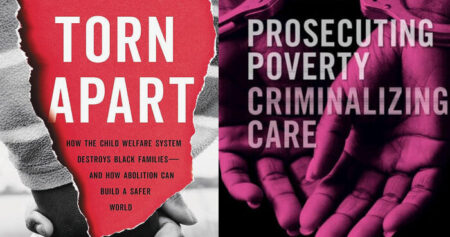
A Call for Institutional Fairness on Palestine
Institutional leaders must affirm that advocacy for Palestinian rights, as well as concern for and celebration of Palestinian lives, is squarely within the sphere of legitimate discourse.

Institutional leaders must affirm that advocacy for Palestinian rights, as well as concern for and celebration of Palestinian lives, is squarely within the sphere of legitimate discourse.

Recent efforts to suppress the expression of the most basic aspirations for Palestinian freedom offend not only civil libertarian commitments to free speech and related ideas of academic freedom, but, perhaps more surprisingly, civil rights commitments to nondiscrimination.

Amna Akbar’s recent article on non-reformist reforms foregrounds a question that the LPE movement often bypasses: namely, how might systemic social change occur in the 21st century? However, in considering this question, the article erases nearly fifty years of theory-work, which has much to teach the legal left as it recovers the notion of non-reformist reform.

Today’s left social movements are increasingly turning to a framework of “non-reformist reform” to guide their efforts to build a just society. But what do non-reformist reforms require? How do they differ from liberal and neoliberal approaches to reform? And what role do law and lawyers have to play in advancing such reforms?

In late October, Florida banned chapters of Students for Justice in Palestine from operating on state university campuses. This ban, which alleges that the national organization provided material support to designated terrorist organizations, is unlikely to survive judicial scrutiny. Nevertheless, it represents a dangerous escalation of recent efforts to restrict the speech of pro-Palestine advocates, while providing a blueprint for the future repression of other disfavored groups.

In his recent post about the LPE Movement’s reticence toward legal theory, Sam Moyn speculates that this aversion may be born of a noble yet misguided deference towards grassroots social movements. Deference, however, does not capture the dynamic relationship between critical legal theory and radical political practice. One does not precede the other or take priority. Instead, from W.E.B. Du Bois to Michel Foucault to Angela Davis, our most important critical thinkers have always engaged in a productive back-and-forth, in which theory and practice constantly challenge, check, and transform each other.

Multinational platform companies, including Uber, iFood, Rappi, and 99, are currently pushing to export the United States’ most exploitative new labor laws to Brazil. Lawmakers should reject these attempts. As empirical evidence from the U.S. context shows, adopting a new “intermediate” worker category would be disastrous for low-income workers, and as Courts around the world have found, platform companies exert high levels of control over their workers and thus should be subject to standard labor and employment regulations.

Though a familiar feature of legal education today, law clinics have a complex history. In the 1960s and 1970s, when student activists demanded curricular reform, law schools embraced clinics as a way to defuse the threat of student power. Looking back at this largely forgotten history helps illuminate the demands that were left behind, and demonstrates the need to reclaim the legacy of more militant student organizing.

In the case against the Stop Cop City activists, the state alleges a criminal conspiracy among people who have distributed flyers, coordinated a bail fund, and performed legal observation of protests. These charges are outlandish and represent a terrifying abuse of state power, but they are hardly novel. As the case of Ray Luc Levasseur shows, RICO has a long history of being used as an expansive assault on leftwing radicals.

Since the early 1990s, the United States has created a scheme of laws allowing private parties to sue individuals, organizations, and foreign countries for acts of terrorism in U.S. courts. While these laws have primarily been used to target and harass Palestinians, the recent spate of violence by Israeli settlers in the West Bank presents a potential if unexpected opportunity: to turn the tables on terrorism torts.

With tenant organizing on the rise across the United States, legal scholars have been drawn to the idea that tenant unions, backed by the right legislative framework, could serve a function akin to labor unions. But labor and tenancy serve different functions for capitalism. Housing is a commodity that tenants consume rather than produce, so tenants would be better served by universal protections, such as price controls and possessory rights, than by the right to good faith negotiation.

In carefully chronicling the history, logic, and operations of the child welfare system and Tennessee’s fetal assault law, Dorothy Roberts and Wendy Bach give us accounts not of singular systems, but of something much more wide-ranging: an almost suffocating network of authorities surrounding marginalized mothers.

Throughout America’s history, the deep-seated idea that poverty is fundamentally a moral failing on the part of the poor has shaped social welfare policies and practices. If they could run their lives properly, the logic goes, they would not be poor in the first place. Accordingly, poor and non-white folks cannot be trusted to care for their children, and thus need to be coerced, through the threat of punishment, into forms of supposedly “therapeutic” state interventions.

When asked why he robbed banks, Willie Sutton reportedly replied, “Because that’s where the money is.” To understand our current system of family policing and punishment, we similarly need begin from the idea that this is a profit-focused system, one that extracts resources by investigating, surveilling, prosecuting, and separating low-income families.

According to the official organs of the family policing system, their goal is to ensure that children are safe and receive proper care. But a closer look at this system demonstrates just how little concern it has for the well-being of children. Instead, its primary purpose is to punish parents – a cruelty exacerbated by the fact that we live in a country that makes parenting nearly impossible.